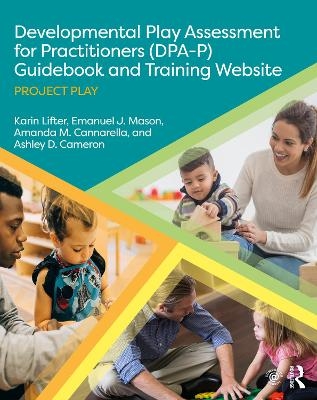
Developmental Play Assessment for Practitioners (DPA-P) Guidebook and Training Website
Routledge (Verlag)
978-0-367-55359-3 (ISBN)
.
Developmental Play Assessment for Practitioners (DPA-P) Guidebook and Training Website: Project Play offers a comprehensive assessment of naturally occurring play activities for evaluating young children’s developmental progress accurately, so that useful interventions can take place as early as possible. It can be used by practitioners in a wide range of educational and therapeutic settings and is designed to support developmental progress through planning interventions in play, and using what we know about a child’s progress in play to plan play-based interventions in cognition, language, motor, social-emotional, and self-help skills.
The guidebook and training website provide a comprehensive introduction to how to successfully use the assessment with infants, toddlers, and young children with disabilities or at risk for disabilities. The comprehensive guidebook offers an overview of the DPA-P and Project Play, defines play, discusses the background literature on play, and explains why this assessment is needed. Clear guidance helps practitioners and family members understand play, how to evaluate play, and how to use play for different purposes.
The guidebook offers:
an introduction to the comprehensive training website and how to use it
understanding of the categories of play assessed and their definitions
guidance on how to administer the assessment and prepare a summary evaluation of a child’s performance
clear instructions for the coding sheets and scoring
guidelines for constructing sets of toys
guidance on taking the results of the DPA-P evaluation of a child’s progress in play to develop a plan of activities for intervention
explanation of how you evaluate activities at the absence, basic, emergence, and mastery levels for developing a plan
suggestions for assembling sets of toys for intervention, based on toys available in children’s homes and early childhood settings
procedures for facilitating or teaching play activities to children who are developing more slowly than their peers
technical aspects of the assessment
To make the DPA-P as flexible as possible for all practitioners, it also offers guidance on adaptations for administering the test, in the coding sheets, with toys to enhance cultural appropriateness for gathering the observations, and for supporting interventions in play.
The Developmental Play Assessment for Practitioners (DPA-P) can be used in natural settings and takes 30 minutes to complete. It is a valuable tool for all those who serve, or are training to serve, young children in early childhood settings, schools, service agencies, colleges, and universities. It will be of great benefit for early intervention personnel, speech-language pathologists, physical therapists, occupational therapists, and psychologists.
Please visit https://www.routledge.com/Developmental-Play-Assessment-for-Practitioners-DPA-P-Coding-Sheets/Lifter-Mason-Cannarella-Cameron/p/book/9781032190310 to purchase sets of the Developmental Play Assessment for Practitioners (DPA-P) color-coded coding sheets.
Karin Lifter is Professor of Applied Psychology at Northeastern University in Boston. She earned her PhD in developmental psychology from Columbia University in New York, and pursued postdoctoral training in developmental disabilities from the University of Massachusetts Amherst. She conducts descriptive and intervention studies on the play, language, and social development of young children with and without disabilities. Emanuel J. Mason is Professor Emeritus of Applied Psychology and School Psychology, Northeastern University, and Professor Emeritus of Educational Psychology, University of Kentucky. He earned his EdD in school psychology from Temple University in Philadelphia. His research and teaching include educational research methods and development of reasoning in children and adults. Amanda M. Cannarella is an adjunct professor and educational consultant in the state of Massachusetts. She earned her PhD at Boston College in applied developmental and educational psychology. Ashley D. Cameron is a licensed psychologist and Nationally Certified School Psychologist in the state of Massachusetts. She earned her PhD at Northeastern University, Boston, and completed her training at Franciscan Children’s Hospital and in public and charter schools. Currently, she serves as a school psychologist in Boston Public Schools.
1. Introduction to the DPA-P 2. The Importance of Play in Development 3. Categories of Play and Their Definitions 4. Administration of the DPA-P and Summary Evalution of Performance 5. How To Use the DPA-P Coding System 6. Activities to be Recorded and Not Recorded 7. Guidelines for Scoring Categories of Play Activities 8. Training Program 9. Guidelines for Constructing Toys for DPA-P 10. Using the DPA-P Results to Design Interventions 11. Technical Information 12. Epilogue
| Erscheinungsdatum | 18.03.2022 |
|---|---|
| Zusatzinfo | 7 Tables, black and white; 13 Line drawings, color; 7 Line drawings, black and white; 25 Halftones, color; 38 Illustrations, color; 7 Illustrations, black and white |
| Verlagsort | London |
| Sprache | englisch |
| Maße | 219 x 276 mm |
| Gewicht | 480 g |
| Themenwelt | Geisteswissenschaften ► Psychologie ► Allgemeine Psychologie |
| Geisteswissenschaften ► Psychologie ► Entwicklungspsychologie | |
| Geisteswissenschaften ► Sprach- / Literaturwissenschaft ► Sprachwissenschaft | |
| Medizin / Pharmazie ► Medizinische Fachgebiete ► Psychiatrie / Psychotherapie | |
| Sozialwissenschaften ► Pädagogik ► Sonder-, Heil- und Förderpädagogik | |
| ISBN-10 | 0-367-55359-7 / 0367553597 |
| ISBN-13 | 978-0-367-55359-3 / 9780367553593 |
| Zustand | Neuware |
| Informationen gemäß Produktsicherheitsverordnung (GPSR) | |
| Haben Sie eine Frage zum Produkt? |
aus dem Bereich


